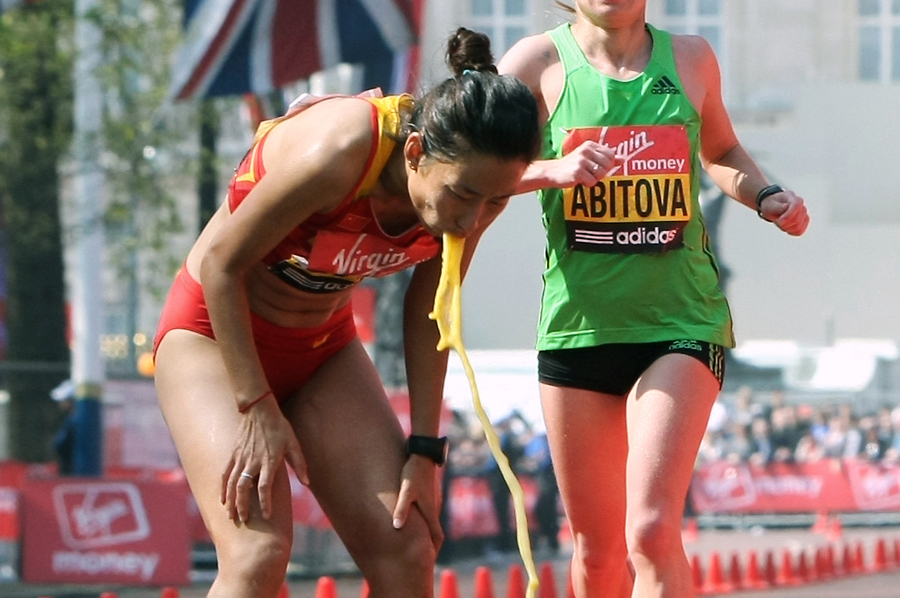You are viewing 1 of your 1 free articles. For unlimited access take a risk-free trial
Caffeine facts vs. caffeine fiction: revealing the truths
Andrew Sheaff presents new research summing up the current best evidence on caffeine use in sport, and answering some of the most commonly asked questions
Caffeine is one of the most effective and most commonly used ergogenic aids in sport. It’s also one of the most effective and most commonly used ergogenic aids in life! As a result, there is a lot of research on the topic, but there are also a lot of opinions about caffeine usage, sometimes founded on evidence and sometimes not. This often leads to considerable confusion.
New research
To cut through this confusion, a team of US researchers has recently carried out a thorough and extensive review of all of the existing caffeine research(1). In this study, published in the Journal of the International Society of Sport Nutrition, the researchers have answered the most commonly asked questions about caffeine by looking at what the complete body of data says on this topic. One question at a time, let’s take a look at what they had to say.
Question #1: Does caffeine dehydrate you at rest?
A common public perception is that caffeine intake will cause dehydration. Unfortunately, this widespread belief is based on a limited number of older research studies. Based upon more recent research, it appears that the caffeine has a very small and likely insignificant impact on hydration at dosages consumed by most humans. Now, if you decide to take extremely high dosages of caffeine, somewhere in excess of 6 mg/kg or 500 mg in total, there is the potential for increased urine output. However, even in this case, if caffeine usage is balanced out by fluid intake, this is unlikely to present a problem.
Question #2: Does caffeine dehydrate you during exercise?
Multiple studies have demonstrated that there appear to be no differences in hydration when the same exercise is performed with or without caffeine. There are many factors that influence hydration status during exercise, including individual differences in sweat rates. More than anything else, it’s fluid intake that determines hydration levels. These factors appear to be much more relevant than caffeine intake. If you consume caffeine as part of a drink, or with fluids, it’s very unlikely to cause dehydration.
Question #3: Does caffeine promote the loss of body fat?
Caffeine has been shown increase the degree of fat oxidation during exercise and at rest. However, that means a larger percentage of calories are burned from fat, not necessarily that more calories are burned. When it comes to weight loss, multiple studies have shown that caffeine can lead to more weight loss. However, these studies tend to use high dosages of caffeine in overweight populations, and often contain other thermogenic compounds (supplements that speed up calorie burning). In other populations, the impact is less clear. Regardless of whether caffeine directly inhibits fat loss, for those who are dieting, caffeine can potentially combat the lethargy and changes in alertness associated with calorie deprivation.
Question #4: Does habitual caffeine consumption influence the performance response to acute caffeine supplementation?
It is common practice by athletes to abstain from caffeine usage prior to major competitions in order to experience the full effects of caffeine use. While this practice seems to make intuitive sense, the evidence from research seems to invalidate it because caffeine habituation does not appear to have any impact on the effectiveness of caffeine. And even if caffeine habituation does have an impact on performance, it can be overcome by simply consuming more caffeine than normal!
Question #5: Does caffeine affect upper vs. lower body performance/strength differently?
There is evidence that caffeine improves both upper body and lower body performance. However, there are multiple studies and reviews showing that upper but not lower body strength is improved by caffeine ingestion - as well as studies and reviews showing lower but not upper body strength is improved. It may therefore depend more on the individual in question and the dosage use. As there has been benefit demonstrated for both, assume that caffeine works for both then try to see what works best for you.
Question #6: Is there a relationship between caffeine and depression?
The relationship between caffeine and depression is nuanced. Caffeine intake has been associated with improvements in mood and alertness, which can positively impact depression, and there is some evidence that regular intake lowers the risk of depression. However, caffeine can also lead to increased anxiety and disruption of sleep, both of which can have a negative impact on depression. Whether caffeine has a positive or negative impact will likely come down to the interaction between the dosage used, together with the tolerance and response to caffeine of the individual in question.
Question #7: Can too much caffeine kill you?
Yes - however, almost anything can kill you! It is almost impossible to die from a caffeine overdose when a healthy person consumes it in the form of naturally occurring beverages and teas. However, if consumed in the form of pill or powders, much higher quantities can be consumed, potentially leading to adverse outcomes.
Question #8: Are there sex differences regarding caffeine’s effects?
Caffeine metabolism is affected by elevations in estradiol as well as contraceptive use. However, the acute physiological response to caffeine intake does not appear to differ between males and females in most research. While there is the occasional study that suggests a potentially more favorable response in males, the overall response seems to be similar in both sexes, and both sexes can expect to improve their performance with caffeine.
Question #9: Does caffeine work for everyone?
Research suggests that caffeine does enhance performance in all individuals. However, there is a large amount of inter-individuality as to how significant this effect is. This is likely due to genetic differences in caffeine metabolism, although known caffeine metabolism genes cannot explain these differences. Different dosages for different individuals may be required for optimal effectiveness. If you have one poor experience with caffeine, it may be a one-off event, or the dosage may need to be adjusted.
Question #10: Does caffeine cause heart health problems?
Caffeine, particular when consumed in the form of coffee, has been shown to have multiple beneficial impacts on health. Multiple epidemiological studies have linked caffeine intake with protection from chronic cardiovascular and metabolic diseases. However, caffeine is a stimulant, and for a heart that is already under stress due to genetic or metabolic factors, it could create additional risk (although this would depend on the dosage of caffeine and the duration of exposure). Indeed, excessive caffeine intake has been related to poor cardiovascular outcomes. Dosage, individual response, and individual risk factors are key here.
Question #11: Does caffeine promote the loss of bone mineral density?
Unfortunately, the research here is mixed. There is some evidence that moderate amounts of caffeine - up to four cups of coffee per day - may actually be protective against the loss of lower-body bone mineral content, while very high caffeine intakes could be problematic for bone density. Although studies conflict, the overall evidence suggests that coffee intake negatively impacts bone mineral content in a dose-dependent manner. With our current state of knowledge, it is difficult to know exactly what the impact of caffeine on bone mineral content is, as well as any other factors that might affect this relationship. Therefore, if bone mineral content is something that is of particular concern for you, conservative use of caffeine may be warranted.
Question #12: Should pregnant women avoid caffeine?
In contrast to some of the previously discussed health-related concerns, the evidence here is much clearer. Caffeine intake has been consistently linked to negative pregnancy outcomes. The ‘safe’ level of caffeine intake has been set at 300 mg per day for pregnant women. However, intakes as low as 100-200 mg have now been shown to be problematic. Adverse outcomes can include those prior to birth such as miscarriage or low birth weight, as well as developmental issues such as cognitive impairments and obesity. As with the other impacts of caffeine intake, there is large inter-individuality at place. However, considering what’s at risk, ‘better safe than sorry’ is a good policy.
Question #13: Is caffeine addictive?
The current evidence for caffeine usage does not fully meet the criteria by medical organizations to meet the standard of addiction. However, this may be somewhat an issue of semantics as caffeine withdrawal has been officially recognized as a diagnosable condition. Regardless of whether caffeine is truly addictive or not, reducing or eliminating caffeine consumption can be a considerably unpleasant experience for some. As a result, use of caffeine should be treated with caution and respect.
Question #14: Does waiting 1.5-2.0 hours after waking to consume caffeine help you avoid the afternoon ‘crash’?
The authors note that this is a strategy that has become popular among social media influencers. While the authors comment extensively on circadian rhythms and the rise and fall of cortisol, the bottom line is that delaying caffeine intake will not prevent an afternoon ‘crash’. They argue that the circadian rhythms will occur regardless of when caffeine is consumed. Further, the same mechanism that is activated by early caffeine intake is activated by early intense exercise - something no one is arguing should be avoided. At the same time, as there’s likely little harm done by doing so, delaying your caffeine intake is an acceptable practice if you find it beneficial in some way.
Practical applications
When it comes to caffeine usage there is a lot to consider. It can clearly benefit performance, yet there are some longstanding myths that simple aren’t true. Further, there are some potential drawbacks that warrant careful consideration when choosing if and when to use caffeine. And unfortunately, the magnitude of these drawbacks, or whether they exist at all, seems to be dependent on a number of factors, both known and unknown. In summary, caffeine is a powerful tool in your performance arsenal, so the best strategy is to make sure you’re using it in a way that maximizes the upsides while minimizing any potential downsides!
References
1. J Int Soc Sports Nutr. 2024 Dec;21(1):2323919. doi: 10.1080/15502783.2024.2323919
Related Files
Newsletter Sign Up
Testimonials
Dr. Alexandra Fandetti-Robin, Back & Body Chiropractic
Elspeth Cowell MSCh DpodM SRCh HCPC reg
William Hunter, Nuffield Health
Newsletter Sign Up
Coaches Testimonials
Dr. Alexandra Fandetti-Robin, Back & Body Chiropractic
Elspeth Cowell MSCh DpodM SRCh HCPC reg
William Hunter, Nuffield Health
Keep up with latest sports science research and apply it to maximize performance
Today you have the chance to join a group of athletes, and sports coaches/trainers who all have something special in common...
They use the latest research to improve performance for themselves and their clients - both athletes and sports teams - with help from global specialists in the fields of sports science, sports medicine and sports psychology.
They do this by reading Sports Performance Bulletin, an easy-to-digest but serious-minded journal dedicated to high performance sports. SPB offers a wealth of information and insight into the latest research, in an easily-accessible and understood format, along with a wealth of practical recommendations.
*includes 3 coaching manuals
Get Inspired
All the latest techniques and approaches
Sports Performance Bulletin helps dedicated endurance athletes improve their performance. Sense-checking the latest sports science research, and sourcing evidence and case studies to support findings, Sports Performance Bulletin turns proven insights into easily digestible practical advice. Supporting athletes, coaches and professionals who wish to ensure their guidance and programmes are kept right up to date and based on credible science.










